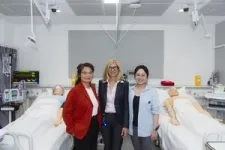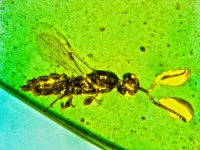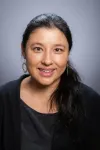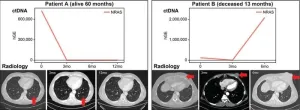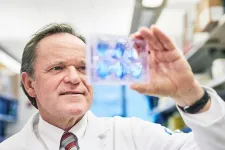(Press-News.org) Some of the thinnest materials known to mankind may provide solutions to scientists in their quest to curb the effects of global warming.
Known as MXene and MBene compounds, these substances are only a few atoms thick, making them two-dimensional. Because of their large surface area, the materials have the potential to absorb carbon dioxide molecules from the atmosphere, which could help reduce the harmful effects of climate change by safely sequestering carbon dioxide.
In a paper published Oct. 4 in the journal Chem, UC Riverside professor Mihri Ozkan and her co-authors explain the potential of MXenes and MBenes in carbon capture technologies.
“In this review, we conducted an exhaustive analysis and proposed strategies for the widespread implementation of these materials in large-scale applications,” said Ozkan, a climate action professor in UCR’s Electrical and Computer Engineering Department at the Bourns College of Engineering.
“Their unique properties make them excellent candidates for capturing carbon dioxide.”
According to Ozkan, these two-dimensional materials can be engineered to selectively capture carbondioxide. One of their key advantages is their high selectivity towards carbon dioxide, which can be attributed to a process called interlayer distance engineering. Additionally, the materials are mechanically stable and maintain their structural integrity even after multiple cycles of carbon capture and release.
graphic
As human-caused carbon dioxide emissions continue to increase, developing carbon-capture technologies has become a top priority. It is projected that the planet's temperature could rise by 1.5°C above pre-industrial levels within the next decade, leading to more frequent severe weather events, worsening drought, crop failures, increased levels of human migration, and political instability. These negative impacts highlight the urgent need for action to curb carbon emissions and mitigate the effects of climate change.
Scientists at Drexel University in Philadelphia, Pa., discovered MXenes and MBenes in the early 2010s. MXene is an inorganic compound made up of atomically thin layers of transition metal carbides, nitrides or carbonitrides. On the other hand, MBenes are dimensional transition metal borides made from boron. These compounds are produced through chemical etching techniques and have crystalline lattices with repeating orthorhombic and hexagonal structures.
Ozkan explained that these materials can be used in conjunction with existing technologies, such as those developed by the Swiss company Climework AS. These systems extract carbon dioxide directly from the atmosphere and sequester it for safe and long-term storage.
Before these compounds can be used in carbon capture devices, several technical issues need to be resolved, according to Ozkan. First and foremost, scientists must address the bottlenecks associated with synthesis-related challenges in large-volume production. Other obstacles to large-scale manufacturing include non-uniform mixing, temperature gradients, and problems with heat transfer, among others.
Still, these hurdles can be overcome.
A top-down approach is ideal for large-scale MXene synthesis by scaling up wet etching methods or developing new ones, according to Ozkan.
The paper's co-authors are UCR's Kathrine A.M. Quiros, Jordyn M. Watkins, Talyah M. Nelson, Navindra D. Singh, Mahbub Chowdhury, Thrayesh Namboodiri, Kamal R. Talluri, and Emma Yuan.
END
Two-dimensional compounds can capture carbon from the air
MXene and MBene compounds hold promise for new technologies to combat climate change
2023-10-05
ELSE PRESS RELEASES FROM THIS DATE:
New type of tiny wasp comes with mysterious, cloud-like structures at ends of antennae
2023-10-05
CORVALLIS, Ore. – Fossil researchers have discovered a novel genus and species of tiny wasp with a mysterious, bulbous structure at the end of each antenna.
The female micro-wasp was described from 100-million-year-old Burmese amber in a study led by George Poinar Jr., who holds a courtesy appointment in the Oregon State University College of Science.
Poinar and Fernando Vega, an independent researcher based in Silver Spring, Maryland, have some ideas about the “clouds” on the ...
Tirzepatide is as effective at treating early-onset type 2 diabetes as diabetes diagnosed later in life
2023-10-05
Tirzepatide is as effective at treating early-onset type 2 diabetes (T2D), a more aggressive form of the condition that normally responds less well to treatment, as it is at treating T2D diagnosed later in life, new research being presented at the Annual Meeting of the European Association for the Study of Diabetes (EASD) in Hamburg, Germany (2-6 Oct) has found.
Tirzepatide belongs to a new class of drugs that mimic the effect of two hormones involved in blood sugar control and appetite suppression, ...
Commonly prescribed antibiotic, antipsychotic and prokinetic drugs are associated with a higher risk of sudden cardiac arrest (SCA) in people with type 2 diabetes, study finds
2023-10-05
New research being presented at the Annual Meeting of the European Association for the Study of Diabetes (EASD) in Hamburg, Germany (2-6 Oct) has identified a range of characteristics associated with a higher risk of sudden cardiac arrest in individuals with type 2 diabetes.
These include the some commonly prescribed antibiotic and antipsychotic drugs, prokinetics (drugs used to treat gastrointestinal symptoms such as nausea and vomiting) and low fasting blood sugar.
Sudden cardiac arrest (SCA) is a leading cause of death. ...
Study reveals distinct illness trajectory in the years leading up to type 2 diabetes diagnosis
2023-10-05
New research presented at this year’s Annual Meeting of The European Association for the Study of Diabetes (EASD), Hamburg (2-6 Oct), reveals a marked increase in several common conditions in the years leading up to, and immediately prior to, type 2 diabetes diagnosis, suggesting considerably earlier diagnosis might be possible in some patients.
“These novel insights into the onset and natural progression of type 2 diabetes, suggest an early phase of inflammation-related disease activity long before any clinical diagnosis of type 2 diabetes is made”, says senior author Dr Adrian Heald from Manchester ...
Is lasting remission of type 2 diabetes feasible in the real-world setting?
2023-10-05
At this year’s Annual Meeting of the European Association for the Study of Diabetes (EASD) in Hamburg, Germany (2-6 Oct) experts will discuss if lasting remission from diabetes is feasible in the real-world setting.
Professor Roy Taylor of Newcastle University, Newcastle, UK, will be speaking in support of the motion
Professor Taylor will argue that through a series of studies in which people with type 2 diabetes were put on low calorie diets, he has shown that lasting remission of type 2 diabetes is indeed feasible in the real world.
He will begin ...
Second international consensus report - clinical translation of precision diabetes medicine
2023-10-05
Precision medicine is part of the logical evolution of contemporary evidence-based medicine that seeks to reduce errors and optimise outcomes when making medical decisions and health recommendations. Diabetes affects hundreds of millions of people worldwide, many of whom will develop life-threatening complications and die prematurely.
“Diabetes recommendations often focus on what works well for the average person. However, because diabetes is an incredibly heterogeneous disease, few people are Mr or Mrs “average” and one-size-fits-all ...
Wastewater surveillance research provides a 12-day lead time for RSV season: new study
2023-10-04
In a first-of-its-kind study, researchers using wastewater surveillance over conventional indicators have predicted the start of the annual respiratory syncytial virus (RSV) season 12 days early, providing more lead time for hospital preparedness and the timely initiation of RSV prevention therapy provided by the province for at risk-infants and young children.
Published in Frontiers in Public Health, the study is the first to describe the relationship between wastewater measurements and clinical data for RSV and to use near real-time wastewater measurements to accurately identify the start of the RSV season.
Working in close collaboration with CHEO Research Institute (RI) ...
Unmet health needs for HIV, hypertension and diabetes in rural South Africa
2023-10-04
The burden of non-communicable diseases like hypertension and diabetes is increasing globally, especially in low-income and middle-income countries where they occur alongside epidemics of communicable diseases like HIV. A large public health survey in South Africa led by Emily Wong, M.D., has assessed the multimorbidity health needs of individuals and communities in rural KwaZulu-Natal and established a framework to quantify met and unmet health needs for individuals living with infectious and non-communicable diseases. The study is published in The Lancet Global Health.
“Applying ...
Blood-based biomarker may redefine the future treatment for advanced melanoma
2023-10-04
Circulating tumor DNA (ctDNA) is emerging as a blood-based biomarker for many solid tumor types, including melanoma. A new study that assessed ctDNA in the blood of patients with BRAF wild-type (BRAF WT) stage III and IV melanoma concludes that measuring ctDNA may lead to alternative treatment options and better outcomes for these patients, report investigators in The Journal of Molecular Diagnostics, published by Elsevier.
For patients with BRAF WT stage III and IV melanoma, there is an urgent clinical need to identify prognostic biomarkers and biomarkers to predict treatment ...
Advances from MSK researchers reported at 2023 ASTRO Meeting
2023-10-04
Researchers from Memorial Sloan Kettering Cancer Center (MSK) were recognized for their achievements at the 2023 meeting of ASTRO, the American Society for Therapeutic Radiology and Oncology. Teams reported new findings about radiation-induced secondary cancers, a new guidance system for radiation therapy, and the consequences of insurance denials, among other topics.
At the meeting, held from October 1 to October 4, 2023, in San Diego, Simon Powell, MD, PhD, FRCP, Chair of MSK’s Department of Radiation Oncology and Enid A. Haupt Chair in Radiation Oncology, was honored with ASTRO’s Gold Medal Award. This award is ASTRO’s highest honor, bestowed upon ...
LAST 30 PRESS RELEASES:
Scientists show how to predict world’s deadly scorpion hotspots
ASU researchers to lead AAAS panel on water insecurity in the United States
ASU professor Anne Stone to present at AAAS Conference in Phoenix on ancient origins of modern disease
Proposals for exploring viruses and skin as the next experimental quantum frontiers share US$30,000 science award
ASU researchers showcase scalable tech solutions for older adults living alone with cognitive decline at AAAS 2026
Scientists identify smooth regional trends in fruit fly survival strategies
Antipathy toward snakes? Your parents likely talked you into that at an early age
Sylvester Cancer Tip Sheet for Feb. 2026
Online exposure to medical misinformation concentrated among older adults
Telehealth improves access to genetic services for adult survivors of childhood cancers
Outdated mortality benchmarks risk missing early signs of famine and delay recognizing mass starvation
Newly discovered bacterium converts carbon dioxide into chemicals using electricity
Flipping and reversing mini-proteins could improve disease treatment
Scientists reveal major hidden source of atmospheric nitrogen pollution in fragile lake basin
Biochar emerges as a powerful tool for soil carbon neutrality and climate mitigation
Tiny cell messengers show big promise for safer protein and gene delivery
AMS releases statement regarding the decision to rescind EPA’s 2009 Endangerment Finding
Parents’ alcohol and drug use influences their children’s consumption, research shows
Modular assembly of chiral nitrogen-bridged rings achieved by palladium-catalyzed diastereoselective and enantioselective cascade cyclization reactions
Promoting civic engagement
AMS Science Preview: Hurricane slowdown, school snow days
Deforestation in the Amazon raises the surface temperature by 3 °C during the dry season
Model more accurately maps the impact of frost on corn crops
How did humans develop sharp vision? Lab-grown retinas show likely answer
Sour grapes? Taste, experience of sour foods depends on individual consumer
At AAAS, professor Krystal Tsosie argues the future of science must be Indigenous-led
From the lab to the living room: Decoding Parkinson’s patients movements in the real world
Research advances in porous materials, as highlighted in the 2025 Nobel Prize in Chemistry
Sally C. Morton, executive vice president of ASU Knowledge Enterprise, presents a bold and practical framework for moving research from discovery to real-world impact
Biochemical parameters in patients with diabetic nephropathy versus individuals with diabetes alone, non-diabetic nephropathy, and healthy controls
[Press-News.org] Two-dimensional compounds can capture carbon from the airMXene and MBene compounds hold promise for new technologies to combat climate change

